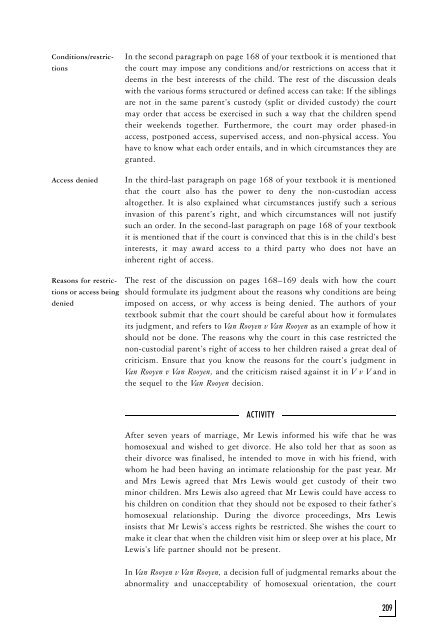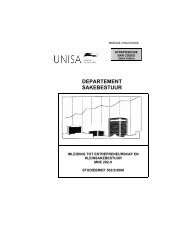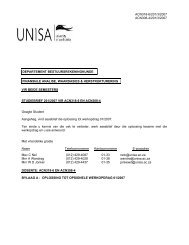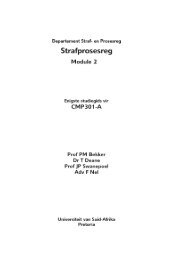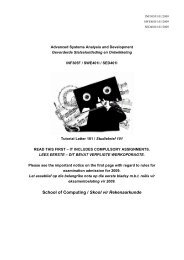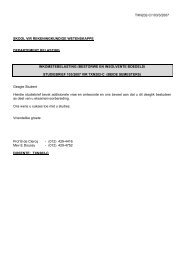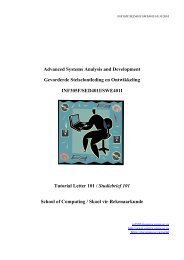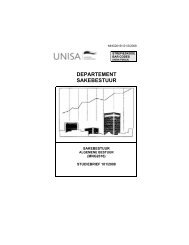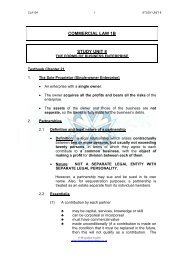key to the study guide - Name
key to the study guide - Name
key to the study guide - Name
Create successful ePaper yourself
Turn your PDF publications into a flip-book with our unique Google optimized e-Paper software.
Conditions/restrictions<br />
In <strong>the</strong> second paragraph on page 168 of your textbook it is mentioned that<br />
<strong>the</strong> court may impose any conditions and/or restrictions on access that it<br />
deems in <strong>the</strong> best interests of <strong>the</strong> child. The rest of <strong>the</strong> discussion deals<br />
with <strong>the</strong> various forms structured or defined access can take: If <strong>the</strong> siblings<br />
are not in <strong>the</strong> same parent's cus<strong>to</strong>dy (split or divided cus<strong>to</strong>dy) <strong>the</strong> court<br />
may order that access be exercised in such a way that <strong>the</strong> children spend<br />
<strong>the</strong>ir weekends <strong>to</strong>ge<strong>the</strong>r. Fur<strong>the</strong>rmore, <strong>the</strong> court may order phased-in<br />
access, postponed access, supervised access, and non-physical access. You<br />
have <strong>to</strong> know what each order entails, and in which circumstances <strong>the</strong>y are<br />
granted.<br />
Access denied In <strong>the</strong> third-last paragraph on page 168 of your textbook it is mentioned<br />
that <strong>the</strong> court also has <strong>the</strong> power <strong>to</strong> deny <strong>the</strong> non-cus<strong>to</strong>dian access<br />
al<strong>to</strong>ge<strong>the</strong>r. It is also explained what circumstances justify such a serious<br />
invasion of this parent's right, and which circumstances will not justify<br />
such an order. In <strong>the</strong> second-last paragraph on page 168 of your textbook<br />
it is mentioned that if <strong>the</strong> court is convinced that this is in <strong>the</strong> child's best<br />
interests, it may award access <strong>to</strong> a third party who does not have an<br />
inherent right of access.<br />
Reasons for restrictions<br />
or access being<br />
denied<br />
The rest of <strong>the</strong> discussion on pages 168±169 deals with how <strong>the</strong> court<br />
should formulate its judgment about <strong>the</strong> reasons why conditions are being<br />
imposed on access, or why access is being denied. The authors of your<br />
textbook submit that <strong>the</strong> court should be careful about how it formulates<br />
its judgment, and refers <strong>to</strong> Van Rooyen v Van Rooyen as an example of how it<br />
should not be done. The reasons why <strong>the</strong> court in this case restricted <strong>the</strong><br />
non-cus<strong>to</strong>dial parent's right of access <strong>to</strong> her children raised a great deal of<br />
criticism. Ensure that you know <strong>the</strong> reasons for <strong>the</strong> court's judgment in<br />
Van Rooyen v Van Rooyen, and <strong>the</strong> criticism raised against it in VvVand in<br />
<strong>the</strong>sequel<strong>to</strong><strong>the</strong>Van Rooyen decision.<br />
ACTIVITY<br />
After seven years of marriage, Mr Lewis informed his wife that he was<br />
homosexual and wished <strong>to</strong> get divorce. He also <strong>to</strong>ld her that as soon as<br />
<strong>the</strong>ir divorce was finalised, he intended <strong>to</strong> move in with his friend, with<br />
whom he had been having an intimate relationship for <strong>the</strong> past year. Mr<br />
and Mrs Lewis agreed that Mrs Lewis would get cus<strong>to</strong>dy of <strong>the</strong>ir two<br />
minor children. Mrs Lewis also agreed that Mr Lewis could have access <strong>to</strong><br />
his children on condition that <strong>the</strong>y should not be exposed <strong>to</strong> <strong>the</strong>ir fa<strong>the</strong>r's<br />
homosexual relationship. During <strong>the</strong> divorce proceedings, Mrs Lewis<br />
insists that Mr Lewis's access rights be restricted. She wishes <strong>the</strong> court <strong>to</strong><br />
make it clear that when <strong>the</strong> children visit him or sleep over at his place, Mr<br />
Lewis's life partner should not be present.<br />
In Van Rooyen v Van Rooyen, a decision full of judgmental remarks about <strong>the</strong><br />
abnormality and unacceptability of homosexual orientation, <strong>the</strong> court<br />
209


